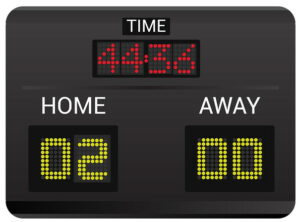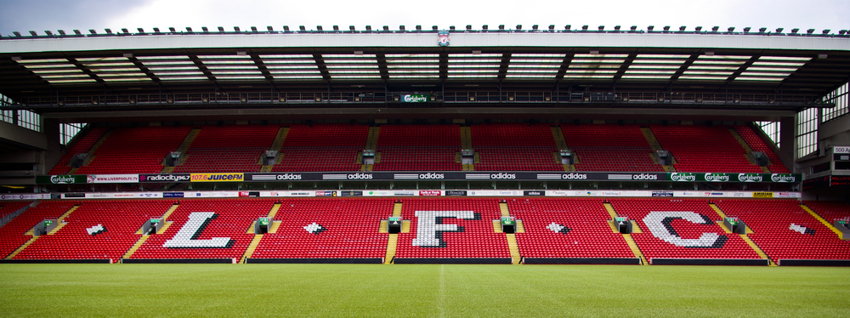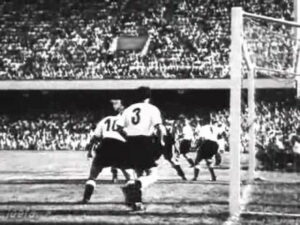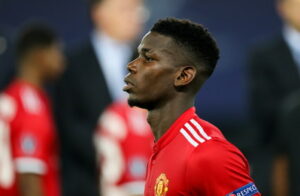 If you’ve ever watched a football game in which one team has gone 2-0 in front then you will almost certainly have heard the commentator, pundit or someone that you’re watching it with refer to 2-0 as a ‘dangerous scoreline’.
If you’ve ever watched a football game in which one team has gone 2-0 in front then you will almost certainly have heard the commentator, pundit or someone that you’re watching it with refer to 2-0 as a ‘dangerous scoreline’.
The suggestion is that teams that go 2-0 up don’t know whether to keep attacking or defend their lead, therefore not really doing either and allowing the opposition back into the game. Once a team gets one goal it is then felt that the momentum is with them, creating this so-called ‘dangerous’ situation.
The obvious question is about whether there’s really any truth in that. After all, wouldn’t a single goal lead with not long left in the match be more dangerous, considering that a solo goal from the opposition would mean that the game is likely to end up in a draw?
A single goal back with a 2-1 lead means that the team that took the lead still wins the game. Instead, is it just likely to be a case of confirmation bias, with matches that aren’t won by a team that took a 2 goal lead more likely to stand out in the memory than ones that are?
One reason we are interested in this is there are now several offers from bookmakers that give you a stake refund or pay you out early if your team goes two goals in front. Are these promotions actually valuable or is it just smoke and mirrors?
How Often Teams Lose A 2-0 Lead At Half-Time
 As you might imagine, it’s difficult to find precise information about teams that have lost decent leads during matches. Not a lot of data companies have that as a specific point that the look for in football matches, limiting the precise nature of what we’re able to tell you. There is still a fair amount of data out there, however. If the home team scores the first goal, for example, then there’s around a 71% chance that they will then go on and win the match based on the results from the 2011-2012 Premier League season.
As you might imagine, it’s difficult to find precise information about teams that have lost decent leads during matches. Not a lot of data companies have that as a specific point that the look for in football matches, limiting the precise nature of what we’re able to tell you. There is still a fair amount of data out there, however. If the home team scores the first goal, for example, then there’s around a 71% chance that they will then go on and win the match based on the results from the 2011-2012 Premier League season.
In December of 2016 Gary Lineker sent a tweet pondering the idea that 2-0 was a dangerous scoreline, questioning how many times, exactly, teams had taken a 2-0 lead only to throw it away. Opta Joe, the statistical analysis account, soon replied to Lineker’s musings saying the following:
There have been 1061 previous occasions of a team being 2-0 ahead at HT in the PL; only 22 have lost from that position (2.1%). Answer.
That is obviously very specifically referring to half-time leads, so it doesn’t take into account a team that goes in 1-0 up, scores another goal early in the second-half and then goes on to lose the game. It does, however, give us a good indication of the sort of stats we’re looking at in terms of teams throwing away such generous leads.
If a team has gone in 2-0 to the good at the half-time break then the opposition only has 45 minutes in which to get themselves back into the match. If a team has a 1-0 break at the interval and scores in the second-half then there’s an even shorter amount of time for them to get themselves back on an even keel, making it even more unlikely.
Using the 2016 tweet from Opta Joe as our basis, then, we can say that only around 2% of matches in which a team take a 2-0 lead will end up with that team losing their match. Whilst that’s not necessarily something you can use when placing ante-post bets, it is very useful indeed in terms of In-Play betting and should be borne in mind.
That doesn’t mean that you should never bet against a team that is 2-0 up, of course. 2% might be a low percentage but it’s not zero percent. Sometimes when watching a match you can have a real sense of how a match is going, so if your instinct is that the trailing team can still get a win then have a look at the odds and make a judgement call; just do so knowing what the stats say.
Manchester United And 2-0 Leads
 During the Premier League era, no team has been more dominant than Manchester United. Under the guidance of Alex Ferguson the club won 13 top-flight titles. Prior to the start of the Premier League they had the same number of First Division titles as Aston Villa the same number of European Cups as them. Between 1993 and 2013, however, they won 13 leagues and 2 European Cups, making them one of the most successful clubs of all time.
During the Premier League era, no team has been more dominant than Manchester United. Under the guidance of Alex Ferguson the club won 13 top-flight titles. Prior to the start of the Premier League they had the same number of First Division titles as Aston Villa the same number of European Cups as them. Between 1993 and 2013, however, they won 13 leagues and 2 European Cups, making them one of the most successful clubs of all time.
That success was underpinned by a solid mentality that Ferguson picked up from his predecessor in the United hot-seat, Ron Atkinson. In fact, Ferguson didn’t actually oversee any defeats during his tenure after his team had taken a two goal lead. When Louis van Gaol’s team surrendered a 2-0 lead to lose to Leicester City in September of 2014 it was the first time that the club had done so since 1984.
In 1984 Atkinson’s Manchester United took a 2-0 lead over Nottingham Forest, Frankie Goes To Hollywood’s The Power Of Love was number one in the charts and Margaret Thatcher had only been in office for half of her eventual tenure. Some people might have chosen to go and see Eddie Murphy star in Beverley Hills Cop rather than attend the game at the City Ground, unwittingly missing out on an historic moment.
Things seemed to be business as usual for the Red Devils when Gordon Strachan put them 2-0 up within half an hour and it took Forest nearly twenty minutes of the second period to get back into the game. They soon did, though, and eventually scored the winner in stoppage time to clinch a 3-2 victory. It would be unfair to say that it was a result that shocked the nation, but it was certainly a surprising turnaround by a team that ultimately finished five places and 12 points behind FA Cup winners Manchester United in the league standings.
It might not have been overly shocking, but it would prove to be significant because the next time that Manchester United surrendered a two goal lead would be 30 years, 29 trophies and 3 managers later. It was also far more humiliating, with Leicester City coming back from 2-0 down to beat van Gaal’s side 5-3 at the King Power Stadium. It was a result that signified just how far the club had fallen since the departure of Alex Ferguson as manager, to the delight of most rival teams in the English top-flight.
Where The ‘Dangerous Scoreline’ Idea Originated

Obviously no one can be certain where football clichés come from, but it’s likely that the idea of 2-0 being a dangerous scoreline was popularised by Josef Csaplár, a Czech television commentator and former football coach. It was something that he used to say so regularly that it earned its own expression, becoming known as Csaplár’s trap.
Every country has its own origin story, of course, with Serbians pointing to its common usage by Milan Živadinović. Australians, meanwhile, believe that Johnny Warren was one of the first to use it Down Under. The aforementioned Gary Lineker also brought it up when talking about a game between Liverpool and Bournemouth in 2016. The Merseyside club went in 2-0 up at half-time but lost 4-3, handing the Cherries their first win against the multiple-time European champions.
Famous Examples
The idea of 2-0 or more being a dangerous lead is almost certainly based on the famous examples of when being ahead by such a margin proved to be less than successful for the team that took the lead.
It makes sense, of course, given that teams that go 2-0 up before going on to win the game are common place therefore far less of an interesting story.
Here are some of the most famous examples of leads being squandered.
Liverpool v AC Milan – Champions League Final 2005

Is there anywhere else to start but with one of the most famous comebacks of all time? Liverpool had ridden their luck a few times during the path to the final, beating Olympiacos 3-1 in the final group game when anything other than a two goal victory would have seen them crash out of the competition. AC Milan, meanwhile, were famed for their defensive work under Carlo Ancelotti.
The Italian side finished second in that season’s Serie A, conceding the second fewest goals behind the champions Juventus. In the end Milan were declared the winners when Juve had the title stripped from them during the following season because of the match-fixing scandal. AC only conceded more than two goals twice during the entire league campaign.
When Ancelotti’s side went 3-0 up in the first-half, therefore, most people assumed that things were done and dusted and they would be lifting the European Cup. Instead three goals in six minutes from Liverpool in the second-half meant that the game went to extra-time and penalties, with the Reds eventually winning after Jerzy Dudek saved Andriy Schevchenko’s penalty. Arguably the most famous comeback ever.
Tottenham Hotspur v Manchester United – Premier League 2001
 It’s very rare that the phrase ‘a game of two-halves’ has such a clear example as in this match. White Hart Lane was absolutely rocking when Tottenham went in with a 3-0 lead over the defending champions Manchester United back in 2001. They had completely outplayed the Red Devils, putting them to the sword in impressive fashion thanks to goals from Dean Richards, Les Ferdinand and Christian Ziege.
It’s very rare that the phrase ‘a game of two-halves’ has such a clear example as in this match. White Hart Lane was absolutely rocking when Tottenham went in with a 3-0 lead over the defending champions Manchester United back in 2001. They had completely outplayed the Red Devils, putting them to the sword in impressive fashion thanks to goals from Dean Richards, Les Ferdinand and Christian Ziege.
Back then, though, it was a different Manchester United to the one that has been on display since Alex Ferguson’s retirement. They looked like an entirely different side after a famous example of the Scot’s ‘hairdryer’ treatment was dished out during the interval. Goals from Andy Cole, Laurent Blanc, Ruud van Nistelrooy, Juan Sebastian Veron and David Beckham resulted in a 5-3 win for the away team, though it wasn’t enough to stop United missing out on the title to Arsenal that year. A double blow for Spurs supporters.
Hungary v West Germany – World Cup Final 1954
 The Hungarian side of the 1950s was one of the best that has ever played football. It absolutely deserved to have a major trophy to its name, not least because it didn’t lose a match between the 14th of May 1950 and the 19th of February 1956.
The Hungarian side of the 1950s was one of the best that has ever played football. It absolutely deserved to have a major trophy to its name, not least because it didn’t lose a match between the 14th of May 1950 and the 19th of February 1956.
Didn’t lose a match, that is, apart from the final of the World Cup against West Germany in 1954. That’s in spite of the fact that they took a two goal lead thanks to Ferenc Puskas and Zoltan Czibor and West Germany had lost 8-3 by Hungary during the group stage of the competition.
The final was hosted in the Swiss city of Bern in Wankdorf Stadium (stop laughing), landing the match the title of the Wunder von Bern in Germany, or the Miracle of Bern in English.
There’s an argument that what followed for both countries had its origins in the result of this match, with West Germany coming back to win the match 3-2, securing their first ever World Cup before doing so another three times over the following sixty years, whilst Hungary just drifted into nothingness.
Manchester City v Manchester United – Premier League 2018
 When Manchester City hosted their rivals Manchester City at the Etihad in April of 2018 they did so knowing that a win would give them the Premier League title for the first time under new boss Pep Guardiola.
When Manchester City hosted their rivals Manchester City at the Etihad in April of 2018 they did so knowing that a win would give them the Premier League title for the first time under new boss Pep Guardiola.
What better needle is there than winning a derby to win the league and show your neighbours that they’re not even remotely at your level? Imagine the excitement in the ground, therefore, when City went 2-0 up thanks to first-half goals from Vincent Kompany and Ilkay Gundogan.
The excitement was short-lived, however, thanks to two goals in as many minutes from Paul Pogba in the second-half. Chris Smalling then popped up to give United a 3-2 win and delay the celebrations of their rivals by at least a few more days.
Ultimately José Mourinho’s side finished 19 points behind their ‘noisy neighbours’ who won the title with a record number of points, with the Red Devils falling off a cliff and the Cityzens going on to defend their title their following season, but at least they didn’t have the pleasure of seeing Kompany and co. lift the trophy in front of them.